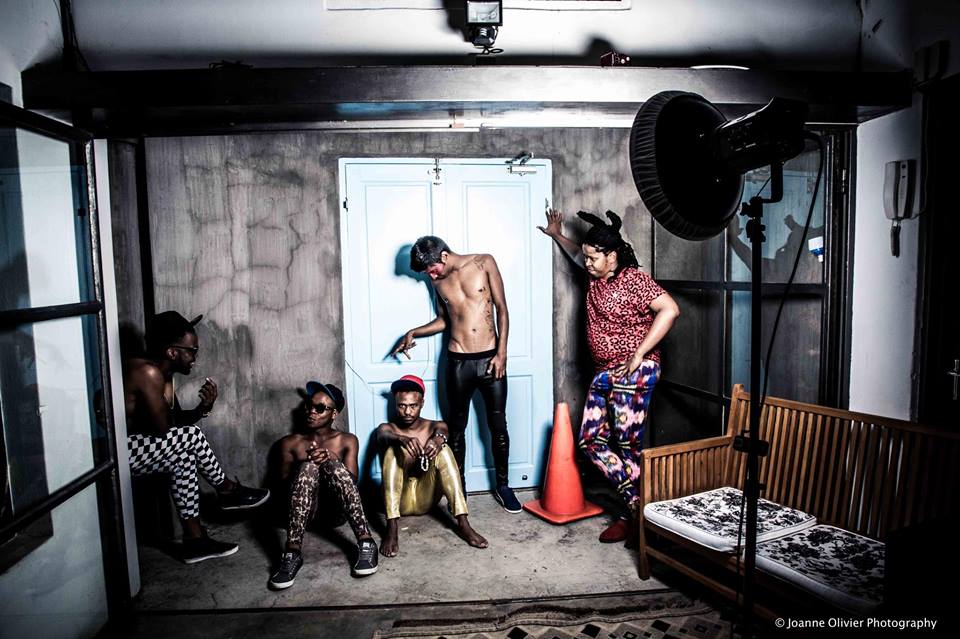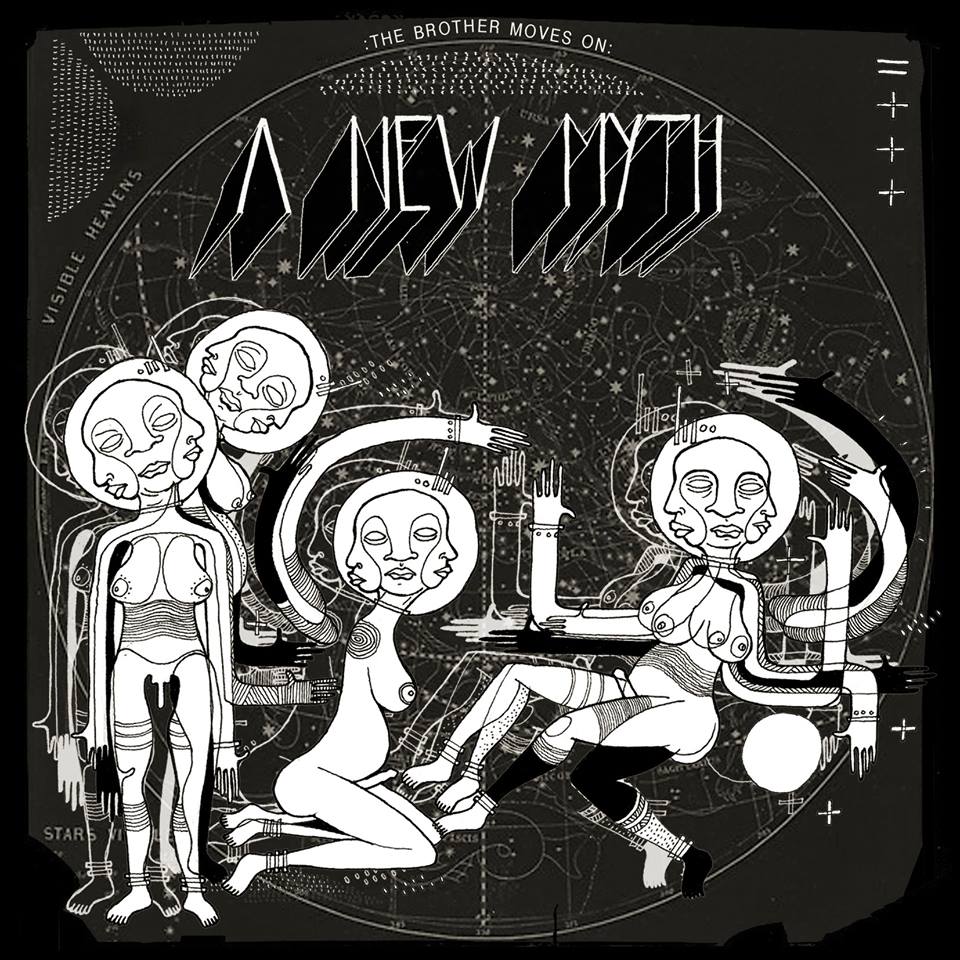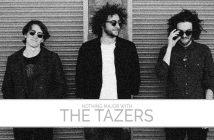The Brother Moves On has been one of our favourites acts in recent times, with performances and ideals which captivate audiences, provoking self awareness and societal discussion. Following their recent performances in the UK through the Future Music Rising campaign supported by Connect ZA and The British Council, we had some time with Raytheon Moorvan, Guitarist of TBMO, to discuss the politics of bands, the politics of arts and the state of the local music industry amongst other topics

© Joanne Olivier
The Fuss – The Brother Mouzone is a character from the TV show The Wire. In the show he plays the part of an atypical hit man, much like your group The Brother Moves On is an unfamiliar hit on any preconceived ideas of local music. Explain to us what the influence behind calling your group The Brother Moves On was?
The Brother Moves On – At the time when the name was conceived, Nkush and Siya were busy watching The Wire. Si had just returned from Rhodes also from splitting with his college band, Orangotang Bitch. The idea of ‘starting another band only for it to end’ was still fresh. In the succeeding months music was being made with many instrumentalists but nothing seemed to stick. Members came and left and the compositions were not being given the attention they needed. Then I met Nkush at old Bohemian. Him and I started talking music and he said that there was this band called The Brother Moves On and that I should join. He oversold it naturally, pyrotechnics, trapeze artists… and I was naïve. So I went to meetup with him late one Tuesday. He was not there. He told Zwash to come meet me. He did. Siya came home from work. We jammed. The next week we were in Grahamstown for Gfest on our first tour with a temporary rhythm section. The compositions fleshed themselves out. People came into the stream and fell out of it on a weekly basis. We kept on playing though. Thus the Brother Moves On. Also, the idea that things can end at any time made it easier to let go of the idea of being in a band which let the compositions breathe. And this was the main point I guess. The ‘composing’ of it all. The notion that we were out to assassinate preconceived ideas about local music only developed later (as the compositions became more formidable) from public opinion and whatnot. We were enjoying ourselves for what seemed to be the first time.
The Fuss – Your group is not in the typical format of band. You are a performance collective who use costume and storytelling alongside music to convey your ideas. Is our local audience, especially the youth, ready for such an act, considering the themes you deal with? It has been said in reference to your performances, “The people want to dance, and we want to tell a story”.
TBMO – Based on what I can see, people are having the same conversation we are [having]with ourselves. Nothing happens without reason. It doesn’t matter whether we’re ready for it or not. Once you’ve reconciled that with yourself it makes it easier to be a soldier about it. And yes… we are at War. Make no mistake.
The Fuss – Your first release, The Golden Wake EP, “tells a fictional tale of a young South African villager named Mr Gold” and when you performed it live it was staged as a performance piece, whereby audience members are invited to the wake of Mr Gold’s funeral. Coincidentally your next release was the ETA EP, which serves to exorcise the demons surrounding the Marikana shootings. Your most recent release is your much anticipated debut album, A New Myth. It seems your entire discography works as one collective piece. Talk us through the critical themes in your art? What is the new myth?
TBMO – I think the most prominent theme would be that of Value. What are the things people value? Why those things? What are the results of such? These are not deep concepts. They are simple. We live in such a conservative place yet conceive of ourselves to be on par with the rest of the world, say the US who have had 200 odd years without slavery, or Europe where the systems have been fortified and disassembled countless times by both people and state.
Psychologically we’re infant. Most of our histories are oral (thus temporary), clandestine, or forgotten. This makes it easy to sell us ideas. We eat them up and spit them back out like it was our idea all along. And this is how we reconcile value.
Thus, I feel that A New Myth is an effort to expose that contrivance. Something that urges us to embrace the mysteries of the mythological, yet keep reinventing ourselves for what comes after all that wonder. We can’t be in awe of ourselves forever. Someone is bound to take advantage of our ignorance and we’ll probably willingly buy into it, because we don’t know any better. When you’re good at something people don’t expect you to change. This is a very dangerous thing when it comes to substantiating our personal (and collective) ideas of value.

The Fuss – Sometimes your audiences are unsure of exactly of how to act in response to your performances and the thematically daring subject matter. Jimi Hendrix once said, “Music doesn’t lie. If there is something to be changed in this world, then it can only happen through music”. What do you aim to achieve with The Brother Moves On and why do you do what you do? What is the response you crave from your audiences?
TBMO – For the most part, we just want to share the music. We’re learning about the world as we learn about ourselves. It’s a gradual process. People are sometimes hard on themselves and then just not and become stubborn about their flaws and defensive about their strengths. I suppose, in our space, we try to cultivate an attitude of presence in relation to this. There is something dutiful about it. A responsibility to make things better than they are. We make music with this at heart. If you’re present with us then you get it too. Hopefully this is what you go home with and feel hopeful that this still exists. I suppose the notion that is most important is that in spite of being inspired by it, the onus is then on you to convey it into the world. If you were present then you felt the bliss and know. That’s a really great currency to work with, the ‘knowing’ that is. When you have a sense of knowing then you’ve confronted all your deepest fears and hopes. The path can only become clearer.
The Fuss – Overall your music is blatant social commentary on the dire situation of our current socio-political landscape. In party@parktownmansions off your debut album you say, “Believe in this revolution and not this party”. Your music is an interpretation of the state of affairs in our society, however, what suggestions do you have for facilitating the revolution?
TBMO – Reconciliation begins with the self.
The Fuss – Fela Kuti was a musician who used music as a cause for creating discourse around the social injustices surrounding him. He would later become a political activist – Can we anticipate a similar path for The Brother Moves On? Or is yours, solely, the role of creating the discussion – asking the questions we’re all afraid to ask?
TBMO – In the band we have differing ideas of what constitutes one’s political responsibility as a citizen. These ideas are constantly shifting. For the most part people in the world don’t look very far outside of their own personal political issues and responsibilities. Most of the time we feel entitled to the luxury of having a political opinion.
Most of the time we don’t even know what constitutes a political opinion and what doesnt.
I think we’ve forgotten real turmoil. Real violence. Fela took care of his people because he understood that they understood this reality. Perhaps if our numerous conflicted societies that we belong to were conflicted with such a reality then The Brother Moves On may stand for a similar cause. Up until then however, I for one refuse to be martyrd on the cross of a system still in the prologue of a complacency or entitlement issue. Worship idols: come back as a moose.
The Fuss – TBMO has chosen to remain independent in a music industry which is struggling to create its own identity and come to terms with what South African music actually is. What do you think the underlying problems in our industry are – Is it a case of commercial media penetrated by Western ideologies, or does the problem lie with an audience who has no appetite for South African ideas?
TBMO – At the onset I would like to make a distinction between the ‘Music Industry’ and the ‘Advertising Industry’. People often mistake one for the other. Most people in the world are passive music listeners. This makes it easy to feed advertising to them. Once people become critical about this then perhaps a new way may dawn. I have watched talented musicians fall into the pitfalls of such and forget the music. Don’t get me wrong, you have to promote youself. But not at the expense of the music. Furthermore, for your convenience, I created a list of a few other underlying problems in our industry:
- No reliable music venues.
- No reliable touring circuit.
- Sound and light technicians (sometimes) don’t realise that they’re the most important part of the show.
- No workshops for kids (and adults) to teach them what we have learned and thus maintain the knowledge within our system.
- Artists really hate one another and thus wont share their knowledge readily.
- Art administrators are usually failed artists and thus hate to see you succeed.
- The people working as administrators, managers and events organisers don’t really LOVE music and usually follow a template of what is expected (ie: We need a ‘house dj’ or a ‘rock band’) rather than being open (and looking out for) truly emergent musical outfits.
- Fame is more important than say the dissemination of knowledge of how to maintain a career, the psychological health of the society which enables us to maintain a career and the true wealth of keeping informed about how to maintain a career.
- People think that one day the well is going to dry up and that love and music are not infinite.
- People forget that Nothing is external.
The Fuss – Your group has played shows in France, Mozambique and have recently performed in the UK. Do you notice any differences between how the audiences overseas and those in South Africa absorb your performances?
TBMO – We have had some time in SA to convince our audiences of the notion of ‘presence’. Naturally we have had some truly awe inspiring gigs at home. The audiences abroad do take notice of the same phenomenon. I think it will take some time before they’re hanging from the ceiling fan. Also there is a very big difference to playing a show where people have come to see you and playing a show where people are seeing you for the first time. In time though…

© Joanne Olivier
The Fuss – You have played shows in various environments, from art galleries to a show on the side of the road on Bree in the city. Tell us about some of your favourite performances? Those performances which left you amazed at the conclusion of your set.
TBMO – I think unanimously Bushfire 2012 and 2013 were both epic. The house on fire stage packed out and things got frantic quickly! The 2013 show was epic because we had never played to 20 000 people before so it was special. We were also on Quantum Leap tour which was our plan to dominate the SADC. We played Mozambique, Swaziland, Reunion Islands, Botswana and played shows in Pretoria and Johannesburg in between each leg. It was the longest most extensive tour we have done so playing Bushfire in the middle and being received so well was great, especially before going on our first trip over the seas to Reunion. Sakifo in Reunion was also epic. Foaming, spastic french-men losing their heads. It was great. The crowd sang ole’ ole’ ole’ at the end in appreciation.
We once played Hoetspruit to a predominantly dutch crowd expecting Mean Mr Mustard. At the end the MC said ‘Hoetspruit! We have to change!’. I thought that one was pretty special.
The slave church gig with Sannie Fox and Derrek Gripper was haunting. It was also our first gig with City Soiree who run an amazing concept where fans pledge for a band to come to their city. Thus the fee is secured before we leave home. The whole concept made that tour uniquely less taxing on us and the gig was in a church, which added a less abrasive yet still edgy demeanour to the whole thing. Our album launch last year at MOAD was insane. We had a semi circular stage so the audience was all around us. We played 2 sets, the second of which lasted longer than I can remember. Our first Smoking Dragon was also intense. There was an electrical storm looming and the stage was set outside. We began playing anyway. The whole setting was eery as fuck with the storm in the background edging itself closer, the audience moving closer too getting rained on but not caring, the wind blowing the stage tarp violently and us just playing hoping not to get electrocuted. Eventually the sky opened and someone reasonable shut us down and moved us inside. I would have preferred to have been electrocuted.
The Fuss – Not many people agree with the ideas you advance through your art. Have there been any hostile reactions you’ve received from the audienwce members during any of your shows?
TBMO – Not so literally. I’ve been sworn at a couple times. I can’t pay attention to it really. The love is out there.
The Fuss – Your sound is a post-genre atmospherical blend of soulful jazz and afrocentric funk, which can lend itself conjuring emotions at both extremes of the emotional spectrum –From the haunting reverberations in Agbal Meditation all the way up to the jovial Dagiwe. How did you decide on your sound? Was it predetermined or rather an organic result of jamming? Also, tell us about some of the artists who influence your particular style.
TBMO – It was organic for the most part. We have ideas that we talk about with ease now. Nothing is strained really. If someone’s ego is with us in a rehearsal then it’s obvious and we kick it out. It’s been working so far. [Artists who influence us include:] Philip Tabane, Busi Mhlongo, Malcolm Jiyane, Moses Molelekwa, Steve Vai, bohren and der club of gore, Tosin Abasi, Omar Roderiguez Lopez, John Fruciante, many hours with the Real books, Coffee… [There’s] too many more to mention.
The Fuss – Finally, having recently released your debut album, where will the Brothers’ journey take you during 2014?
TBMO – Im expecting a baby boy in a couple of days. The guys have been mad accomodating about it and thus our year plan has been formed around it essentially. We have started recording again and plan to be back in studio soon. The new tracks are sounding amazing and I think we have found a couple great studio techniques that work well for us. We have two European trips planned for July and November and one in the US. The conversations have started on those fronts. There are a few contacts in South America as well that we plan to connect with soon but that will probably only manifest in 2015. Some of the gents want to go back to studying more seriously so there is talk of running workshops and talks or creating a syllabus for such as well. Some of the gents have residencies and other musical projects in the works. Generally getting more music out is the point. That’s the whole point right? The music?
The Brother Moves On | Facebook | Twitter | Bandcamp






